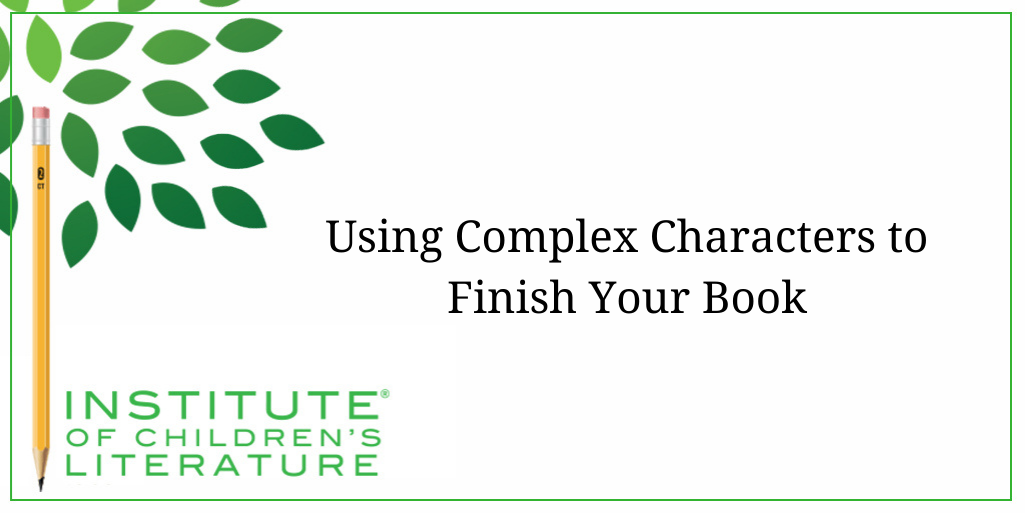
5 Ways Writers Can Prep for 2025 Goal Setting
Before we roll on to the new writing year, let’s harness our optimism for the blank slate before us and prepare for our 2025 Goal Setting just for writers.

We teach our students how to write and get published!
View our Course Catalog >
When writing for kids (or even adults), one of the things that will quickly slog down a novel or short story and keep a writer from finishing happens when the writer doesn’t know what to do next. Sometimes this comes from a lack of planning and not knowing what you’re ultimately moving toward, but sometimes this happens simply because the writer doesn’t know what these characters should and would do in these circumstances. In this post, learn to develop your characters and finish your book.
Overall characters need to be people, not pawns. Pawns are one-dimensional and are simply placed and moved to advance the game. This can be helpful if all you need from the character is for her to walk into a scene and deliver a single line. Some characters simply don’t need complex backstories (though I will always argue that they need distinct personalities. A flat character can flatten a scene just by passing through it.).

Of course, as with so many things, sometimes the cure creates its own problems. After all, people are far harder to control than pawns. This is why writers will sometimes remark how their characters insisted on doing something or refused to do something else. Obviously, this is said partially in jest. The writer is putting the words on the paper, and the characters live only in those words, but if the characters are fully fleshed out, there are things that this person in this situation simply would not do. Because of this, the writer has the difficult job of juggling all these people they’ve created and keeping up with what each one of them is likely to do based on their personalities, their personal baggage, and their motivation at any given moment. The best way to keep these unruly characters in order is to know them deeply and change the character if you need to change the story.
Each character in your book is living out their own story. You have chosen a main character, but every other character is living their own life also. Your primary task as a writer is to populate your story with the people who will best work together to fight their way to the final goal, or perhaps who clash so hard it shoves them toward the final goal. The characters need to be more than their role. They need to be individuals who are working toward goals for their own reason. If you want them to do what you want in the story, you need to choose a character who will naturally want to do it. If you don’t, these characters will eventually leave you stuck and frustrated.
A well-chosen character that feels real will keep the writer moving forward because the character becomes a person for the writer. And people are prone to doing stuff, especially under pressure. The main character is acting and reacting to the story’s conflicts and pressures, but all the other characters are also acting and reacting to their own story pressures. And if you know what those are, your story is a lot less likely to be bogged down in inaction.
If you approach the problem of an unfinished book as potentially a character problem, you can consider each character and what they are bringing to the story. Sometimes this careful study of the characters will make you realize that this person would act this way in your stuck situation and thus get you unstuck. But sometimes you realize that this person is simply never going to get the story to the end.
Sometimes you realize you need to recast the role of the best friend or worst enemy or even the role of the main character. I like to think of it as hiring a new actor when the old one couldn’t carry the role. I consider the ways in which the character created a problem, and I then imagine who I would need to avoid that. I’ve seen authors do this by dragging in a character to save the day, but the story will often finish best if you retool the characters you already have. Then you have no need for a new savior character, because you had the person who would bring about the ending in the story the whole time.
Keep in mind that major changes to a character will force you into rewriting. Some people shy away from that (hence the tendency to inject the character out of the blue to save the day). The result is not only a story that you can finish, but also a stronger story overall where the ending won’t feel contrived or unlikely but will grow logically from what these people would do under these circumstances. It will result in a story that readers can love. And don’t we all want that?
With over 100 books in publication, Jan Fields writes both chapter books for children and mystery novels for adults. She’s also known for a variety of experiences teaching writing, from one session SCBWI events to lengthier Highlights Foundation workshops to these blog posts for the Institute of Children’s Literature. As a former ICL instructor, Jan enjoys equipping writers for success in whatever way she can.

Before we roll on to the new writing year, let’s harness our optimism for the blank slate before us and prepare for our 2025 Goal Setting just for writers.

Writers can be thin-skinned when it comes to getting feedback on their work. Let’s look at 4 ways to positively deal with constructive criticism!

Rejection is part of the territory when it comes to being a writer. Today we offer reflection for writers to help redirect your efforts after a rejection.
1000 N. West Street #1200, Wilmington, DE 19801
© 2024 Direct Learning Systems, Inc. All rights reserved.
1000 N. West Street #1200, Wilmington, DE 19801
© 2024 Direct Learning Systems, Inc. All rights reserved.
1000 N. West Street #1200, Wilmington, DE 19801
© 2024 Direct Learning Systems, Inc. All rights reserved.
1000 N. West Street #1200, Wilmington, DE 19801
© 2025 Direct Learning Systems, Inc. All rights reserved.
1000 N. West Street #1200, Wilmington, DE 19801
©2025 Direct Learning Systems, Inc. All rights reserved. Privacy Policy.
1 Comment